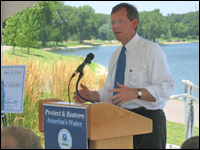A day after winning the presidential election last week, George W. Bush made this now-legendary — and, to some, menacing — statement: “I earned capital in the campaign, political capital, and now I intend to spend it.” Without dwelling on the notion that conservatives are supposed to protect and grow capital, not fritter it away, environmentalists are wondering just where and how President Bush is going to spend his political booty in the natural-resource realm.

Leavitt: A man with a plan — or at least a clear agenda.
In much the same way he spent his more limited allowance in the last go-round, according to U.S. EPA chief Mike Leavitt. As reported in Greenwire last Friday, Leavitt told the press that the Bushies will proudly stay the course on their environmental agenda — one widely condemned by environmentalists, but newly bolstered by the election. “We now have a clear agenda, one that’s been validated and empowered by the people of this country,” he said.
If past is indeed prologue in the Bush administration, say enviros, it’s fair to assume that a key beneficiary of the president’s newfound capital will be the energy industry. During Bush’s first term, efforts to weaken clean-air regulations and expedite oil and gas drilling were regarded as paybacks for campaign contributions. This time around, the energy and natural-resources sector made record donations to Bush’s campaign — a total of $4.4 million for the 2004 cycle, according to the latest data from the Center for Responsive Politics, compared with $2.8 million in the 2000 campaign.
“Right now Karl Rove is saying, ‘First things first, George. These are the folks that floated our campaign, we need to give them our thanks,'” said Dan Becker, director of the Sierra Club‘s Global Warming and Energy Program.

Caribou frolicking in the Arctic Refuge.
Photo: Ken Madsen.
Now that the Republicans have gained four seats in the Senate, giving them a 55-45 advantage, there’s a good chance that the 109th Congress will enable President Bush to hand his corporate contributors one of the most sought-after prizes of all: Alaska’s Arctic National Wildlife Refuge. Bush is also better positioned to get Senate approval for his stalled-out energy bill, which has been widely criticized on both sides of the aisle as pork at its worst, with its billions of dollars in subsidies for fossil-fuel producers and other special interests.
There have been rumblings on Capitol Hill that the energy bill could come up for consideration during the lame-duck session that will begin on Nov. 16, even before the 108th Congress adjourns at the end of this year. Lame-duck sessions are typically more rushed and insulated from media scrutiny than other sessions, which could be advantageous when pushing forward a highly contentious and complex piece of legislation.
But most observers think the energy bill won’t get off the ground until 2005. “No one expects the Republicans to go to great lengths to move it now when they can just rewrite it next year, and they’ll have the advantage of a bigger margin,” said Karen Wayland, legislative director for the Natural Resources Defense Council.
Indeed, energy-bill advocates insist that the new Republicans who’ll be taking office in January will put them in good stead: “We have more than enough votes for an energy bill,” Sen. George Allen (R-Va.), chair of the National Republican Senatorial Committee, declared at a press conference last Wednesday.
Scott Segal, a lobbyist for the industry group Electric Reliability Coordinating Council, shares Allen’s optimism. “Things are definitely looking up for an omnibus energy bill,” he told Muckraker. “Not only is there a larger operating majority for Republicans, you’ve got to consider the cost of energy: We’ve had sustained oil prices above $50 [a barrel], which is a real red-flag zone, and natural gas at three times the historical average. This could very well stimulate the passage, particularly among moderate Democrats and more liberal Republicans.”
A big sticking point for the energy bill, though, is its MTBE provision, which would indemnify producers of the gasoline additive MTBE against water-pollution lawsuits. “The energy bill got jammed on the MTBE provision and never got unstuck,” said Bill Wicker, spokesperson for Democrats on the Senate Energy and Natural Resources Committee. “Even though there are nine new senators coming to town [seven Republicans, two Democrats], nearly all of them will vote the same way on this issue as their predecessors.”
It’s true that extra support for the bill in the Senate will come from Richard Burr of North Carolina (replacing Democrat John Edwards), Mel Martinez of Florida (replacing Democrat Bob Graham), and Jim DeMint of South Carolina (replacing Democrat Fritz Hollings). But Republican John Thune, who will take the place of Senate Minority Leader Tom Daschle (D) from South Dakota, won’t amount to a gained vote because Daschle was a strong supporter of the energy bill. Two more GOP gains are canceled out by Democrat Barack Obama of Illinois (replacing Republican Sen. Peter Fitzgerald) and Democrat Ken Salazar of Colorado (replacing Republican Sen. Ben Nighthorse Campbell). Salazar is from a strong oil and gas state, so his pro-environment vote on this bill is not guaranteed, but Becker, whose organization endorsed Salazar’s campaign, says it’s very likely.
Moreover, peer pressure from reenergized GOP colleagues won’t easily sway some New England Republicans: “John Sununu and Judd Gregg are Republican senators from New Hampshire who voted against the bill because of the MTBE provision,” said Becker, “but New Hampshire is currently suing MTBE manufacturers because of water contamination in the state, so switching their vote would undermine their state’s legal position.” Also, the Republican senator from Nevada, John Ensign, is unlikely to change his no vote because the bill is loaded with subsidies for the nuclear-power industry and could therefore lead to the generation of more nuclear waste. As the Bush administration already wants to dump existing nuclear waste at Yucca Mountain in Nevada, to the ire of Ensign’s constituency, a nuke-friendly energy bill isn’t likely to go over well in the Silver State.
According to Wicker, many folks on both sides of the aisle now think the energy bill should be broken down into smaller digestible bites, and the MTBE provision dropped. “That’s far more realistic than trying to force everyone to swallow one gargantuan bill whole,” even with the new Republican votes, he said.
The piecemeal strategy could prove successful on many fronts, including on the Arctic Refuge. “The vote numbers effectively haven’t moved on MTBE [given the new makeup of the Senate], but the numbers have moved on ANWR,” said Wicker.
Here’s why: While Daschle voted for the energy bill, he was a steadfast opponent of drilling in ANWR; his successor will support both. And while Obama will almost certainly vote against drilling in ANWR, his predecessor Peter Fitzgerald was one of the few Republicans who also opposed it, meaning that Obama adds no new votes to the ANWR opposition. Also, Republicans are much more vulnerable to peer pressure on this issue given that there are no regional reasons (such as MTBE contamination or Yucca Mountain) for them to oppose it.
According to Wicker, the congressional leadership is expected to make opening ANWR a part of the budget reconciliation process early next year by tacking the ANWR provision onto a budget bill that cannot be filibustered, so it would need only 50 votes to pass rather than the 60 necessary to avert a filibuster. “They tried to do this in 2003 and failed, but the reality is that with four new Republican votes, open-ANWR proponents have the wind at their back,” he said.
Becker of the Sierra Club said this may be just what environmentalists need. “The public opposition to drilling in the Arctic Refuge is huge. People have come to associate it with greed rather than need.”
And historically the perception of greed has galvanized public opposition to initiatives that are overly friendly to industry and unfriendly to the environment and public health. Lawmakers and business lobbies overreach, and then get slapped by public opinion. This is precisely what happened with the MTBE liability exemption, for instance. It’s what happened during Bush’s first term when the EPA tried to weaken standards for arsenic in drinking water and exempt millions of acres of wetlands from protections — initiatives that stirred up so much controversy they simply couldn’t survive.
“Right now,” said Becker, “greed is the best friend that the environment has.”

